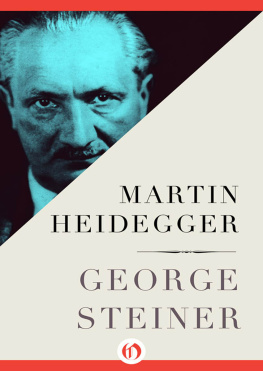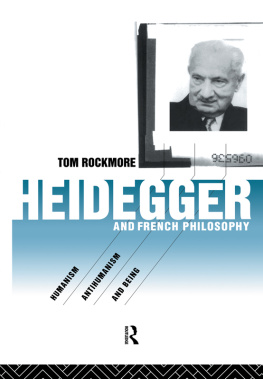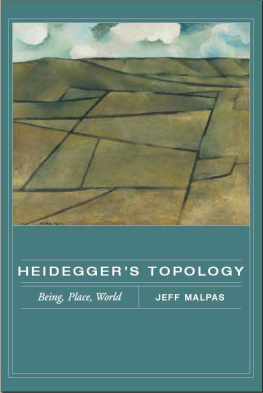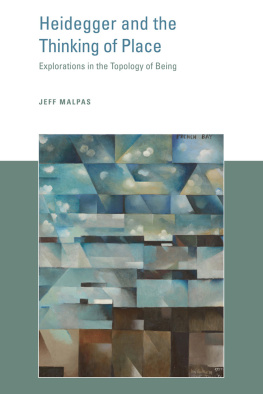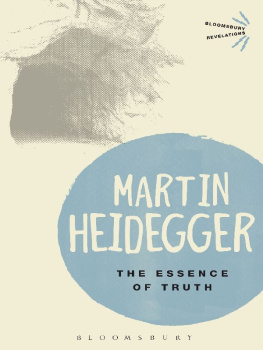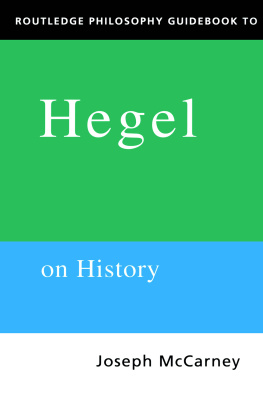Steiner George - Martin Heidegger
Here you can read online Steiner George - Martin Heidegger full text of the book (entire story) in english for free. Download pdf and epub, get meaning, cover and reviews about this ebook. City: New York, year: 1979, publisher: Open Road Integrated Media;Viking Press, genre: Religion. Description of the work, (preface) as well as reviews are available. Best literature library LitArk.com created for fans of good reading and offers a wide selection of genres:
Romance novel
Science fiction
Adventure
Detective
Science
History
Home and family
Prose
Art
Politics
Computer
Non-fiction
Religion
Business
Children
Humor
Choose a favorite category and find really read worthwhile books. Enjoy immersion in the world of imagination, feel the emotions of the characters or learn something new for yourself, make an fascinating discovery.
- Book:Martin Heidegger
- Author:
- Publisher:Open Road Integrated Media;Viking Press
- Genre:
- Year:1979
- City:New York
- Rating:4 / 5
- Favourites:Add to favourites
- Your mark:
- 80
- 1
- 2
- 3
- 4
- 5
Martin Heidegger: summary, description and annotation
We offer to read an annotation, description, summary or preface (depends on what the author of the book "Martin Heidegger" wrote himself). If you haven't found the necessary information about the book — write in the comments, we will try to find it.
Abstract: Discussion of the work of Martin Heidegger
Martin Heidegger — read online for free the complete book (whole text) full work
Below is the text of the book, divided by pages. System saving the place of the last page read, allows you to conveniently read the book "Martin Heidegger" online for free, without having to search again every time where you left off. Put a bookmark, and you can go to the page where you finished reading at any time.
Font size:
Interval:
Bookmark:

Martin Heidegger
George Steiner

For David, who asked
Some Basic Terms
i
Was ist dasdie Philosophice? asked Heidegger at a colloquium held in France in August 1955.is at once the source and core of his entire thought) that ist, the postulate of existence, is previous to and crucial within any meaningful question; and he suggests that das, the quid estthe quiddity as the schoolmen would saythe whatness to which this or indeed any serious question addresses itself is a profoundly complex postulate. Such a postulate of integral presence may be unavoidable, but it is not to be invoked unexamined. Furthermore, by setting off die Philosophie, by compelling a hiatus and pause between the most general form of ontological query (namely, What is this or that or anything?) and the object actually in view, Heidegger achieves a subtle twofold effect. He makes the notion philosophy, of which we might have claimed an everyday, confident control, somewhat strange and distant; and he makes it dependent on, ancillary to, the greater, more pressing question and notion of isness and whatness. Thus a fuller translation of his title could read: What is it to askwhat this thing, philosophy, is?
It is our task, begins Heidegger, to set discussion on its way, to bring it onto a path. The indefinite article is intended to underline the postulate that this path is only one among many, and that there is no a priori guarantee that it will conduct us to our goal. It is Heideggers constant strategy to show that the process of undertaking, the motion on the way, not only precedes the attainment of whatever goal we have set ourselves yet, as we shall see, in some sense equals this goal in dignity and meaning. But although the path chosen will be one of many, it must lie inside the forest. It must give us the assurance that we are moving within philosophy and not outside of it and around it. This qualification is consequential: it implies the famous dilemma of the hermeneutic circle: we attempt to define a thing by the use of attributes that already presume a definition. It implies that there are other paths which lead out of the forest and thus mislead (e.g., the history of philosophy, the analysis of philosophic arguments as being the ideological manifest of socioeconomic forces, the view of philosophy as an allegoric preface to the exact sciences, and so on). A path, says Heidegger, not any path.
The customary paths are those which begin with a definition, even if and especially where this definition is subsequently to be dismissed or radically refined (as in the Socratic method). Heidegger offers: philosophy not only is something rational but is the actual guardian of reason. For reason he does not use Vernunft, but ratio, the Latin term with its Aristotelian overtones. Guardian is Verwalterin, a word that includes resonances, crucial for Heidegger, of trusteeship, the active custodianship of inherited substance. Even cursory reflection, however, shows that this path will lead nowhere. By introducing the concept of reason or rationality, we have merely substituted one unknown for another. The Heideggerian Weg, the woodsmans trail, is quite different. And only because it is the nearest at hand is it difficult to find. (Heidegger treasures, and reverts insatiably to, this paradox of proximity, this finding, which is both Socratic and phenomenological, that the highest densities of meaning lie in the immediate, in the most obviously at hand.) We are asking: What is this whatnesswhich we name philosophy? We are asking a word to disclose itself. How can there be disclosure if we do not listen closely, if we seek to press up on the object of our inquiry some previous or ready-made analytic formula? If we hear the word philosophy coming to us from its source, it sounds thus: philosophia. Now the word philosophy is speaking Greek. The word, as a Greek word, is a path.
Here we have before us the most characteristic and disputed move in Heideggers method: the argument from and through etymology. The manifold uses of this argument, and Heideggers justification of it, will preoccupy us throughout this book. What needs emphasis at this preliminary point is the full generative and evidential aim of Heideggers maneuver. Das Wort Philosophie spricht jetzt griechisch. This means, literally, that the word itself, if we hear it rightly, speaks Greek. It is not we who are using a word that happens to be derived from the classical Greek lexicon. The power and agency of statement lie inside the word philosophia (which Heidegger does not transcribe, but sets on the page in its Greek characters). It is language that speaks, not, or not primordially, man. This, again, is a cardinal Heideggerian postulate, to which I must return. And what does the word tell us? The word philosophia tells us that philosophy is something that, first of all, determines the existence of the Greek world. Not only thatphilosophia also determines the innermost basic feature of our Western-European history. (Innermost basic feature is an honest attempt at rendering Grundzug. In German, and most notably in Heideggerian German, Grund portends intensely concrete but also numinous strains of rootedness, of earthly ancientness and provenance.) Philosophia is, therefore, the foundation and shaping impetus of Western history. And because it is Greek in its nature and in the articulation that alone can give it authentic meaning and continued existence, philosophy demands of those who would apprehend it, of those whose path of asking is truly inward and disinterested, that they rethink the full range of its implications as these were experienced and voiced by the Greeks. (I am, at this stage, leaving to one side the obvious challenge as to whether any such rethinking is possible, as to whether meditation on etymology, however probing, can go upstream in time and discover primal sources. What we want to do initially is to see how Heidegger conducts his argument.)
It is not only philosophy that is Greek: it is also how we question, the manner in which, even today, we ask the question. For to ask What is that? is to ask ti estin? an interrogation whose terms are the seed and dynamic articulation of Greek (therefore of all subsequent Western) thought. The meanings assigned to what will vary as between Plato and Aristotle or as between Kant and Hegel. The Platonic Idea is not the Aristotelian substance or the Kantian thing in itself. But the underlying question and the verbal form of the questionthe two being for Heidegger wholly fusedare Greek. In asking about isness and whatness, in referring this asking to philosophy, we are peculiarly summoned back to the Greek wellspring. We are reclaimed for and by it as soon as we not only utter the words of the question What is philosophy? but reflect upon its meaning. In German, origin, source can be Herkunftliterally the place from which we came, the provenance of our coming. Heideggers zurckgerufen and re-klamiert carry an almost physical edge. There is a re-vocation, a summoning back to the place of our inception and instauration. It is that of Greek speech and thought or, more exactly, speech-thought. Nor is it any question that we are asking, that we are being revoked by: it is the question of our Western-European actuality and being, our Dasein
Font size:
Interval:
Bookmark:
Similar books «Martin Heidegger»
Look at similar books to Martin Heidegger. We have selected literature similar in name and meaning in the hope of providing readers with more options to find new, interesting, not yet read works.
Discussion, reviews of the book Martin Heidegger and just readers' own opinions. Leave your comments, write what you think about the work, its meaning or the main characters. Specify what exactly you liked and what you didn't like, and why you think so.

